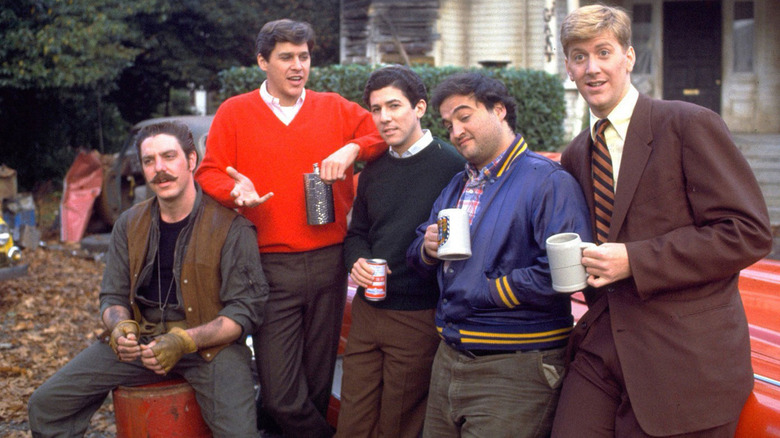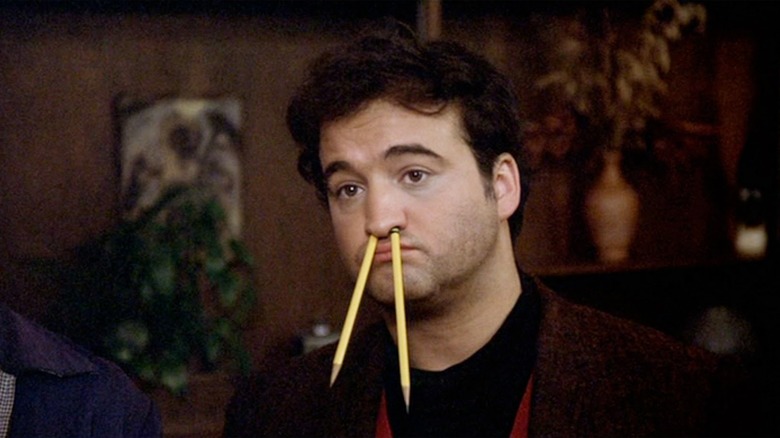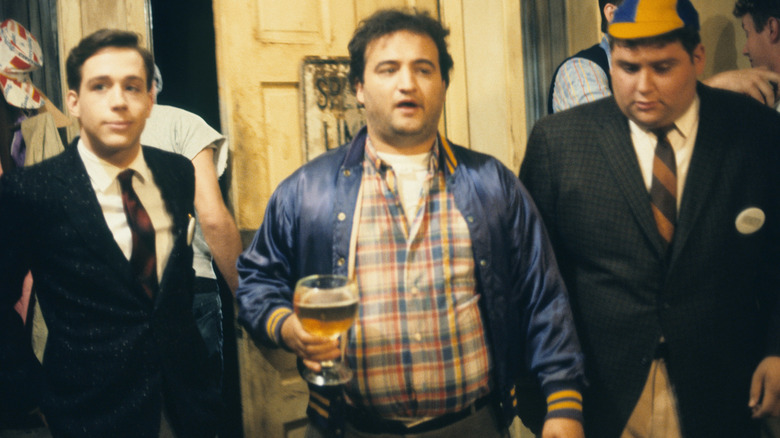Not Everyone At The National Lampoon Was Happy With The Success Of Animal House
"Animal House" was the first movie ever created under the name of National Lampoon. It made the humor magazine a household name, but not everybody on the staff was interested in venturing into the movie business. In fact, some of the writers and editors at the magazine felt that the film brought on an unwelcome shift that would eventually render them obsolete.
The film arrived in 1978, eight years after National Lampoon was founded, and achieved instant success. The magazine went on to attach its name to a number of other films, including 1983's "Vacation," which was so popular it exploded into its own movie franchise.
The success of "Animal House" brought a lot of new readers to the magazine, and it also brought a lot of the magazine's writers into the entertainment business. One of the magazine's founders, Henry Beard, had warned the staff against going into film and television before he moved on. Or so wrote National Lampoon movie producer Matty Simmons in his book "Fat, Drunk, & Stupid."
"Before he'd left in 1975, Beard had said he never wanted us to go into the entertainment business," Simmons recalled. "He always felt the magazine would suffer if we did. He was probably right."
After "Animal House," Simmons noted lots of staff members left to write for Hollywood and fewer alumni from the Harvard Lampoon were interested in joining the magazine at all. The magazine remained in print until 1998, but some feel that its golden years were already behind it by the late 1970s.
Some of the magazine staff were reluctant to go into film and TV
Henry Beard wasn't the only one from National Lampoon magazine that took issue with "Animal House." One of the earliest editors, Tony Hendra, was apparently disappointed that he wasn't included and reigning editor-in-chief P.J. O'Rourke was against working in film and television altogether.
"P.J. O'Rourke stated very clearly that he had no desire to make movies," Matty Simmons claimed in his book, "and, as a matter of fact, with one brief exception, to this day he has never been involved with moviemaking, despite his popularity."
Simmons is presumably referring to O'Rourke's co-writing credit on the Rodney Dangerfield comedy movie, "Easy Money." O'Rourke may have been a "man of letters," as Simmons put it, but he bore no ill will towards the first "National Lampoon" film.
"I bought my first house because of 'Animal House," O'Rourke told The A.V. Club. "Not that I had anything to do with the movie, but at one point, I went in and asked for a raise, and they cried poor and offered me stock options instead. And, in the wake of 'Animal House,' the stock briefly and quite wrongly shot up. So I love that movie."
National Lampoon even helped launch careers, including that of "The Breakfast Club" director John Hughes.
But everybody still loved Animal House
Henry Beard may have been a man of the "literary tradition," as Matty Simmons puts it in "Fat, Drunk & Stupid," but he had no hatred towards "Animal House" either. He had his reasons for not working in film and television during his time at the National Lampoon, but they had nothing to do with morality.
"Because we worked so hard on the Harvard Lampoon, and later National Lampoon, we weren't thinking about doing movies," he told Vulture. "The deadlines for the magazine were brutal. Months come every seven days. It was just unbelievable." Beard wasn't even upset when some of the greatest writers he hired for the magazine, like Doug Kenney, left to work in Hollywood.
"Doug just had a great, natural comic instinct, which could be applied to anything," said Beard. "When he got the opportunity to do 'Animal House' [in the mid-'70s], it was clear that was what he was really meant to do."
Even though some of the staff may have been hesitant about moving into film and TV themselves, they were not outspoken in their criticisms. "Animal House" — which was offered to a number of directors — gave National Lampoon a lot of attention to be grateful for, even if it eventually led its writers away from the magazine and into moviemaking.


